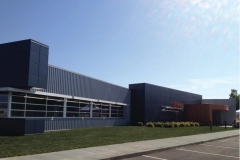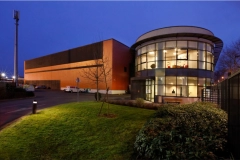Metaverse Building Boom: Meta Adds 3 Data Centers at Illinois Cloud Campus
Metaverse Building Boom: Meta Adds 3 Data Centers at Illinois Cloud Campus
Meta continues its extraordinary expansion as it prepares its digital infrastructure for the metaverse. Meta will invest more than $1 billion to add three more data centers to its cloud campus in DeKalb, Illinois, the company announced today.
Meta is stepping up its investment in data centers to power its transition from Facebook to Meta, retooling for the requirements of 3D virtual worlds, which require more computing power than social networking applications. As it develops the software side of its metaverse, Meta is building more data centers to ensure that
That means building data centers in bunches, as seen in the expansion in DeKalb, which will bring its campus to 2.4 million square feet of data center space, and support 200 jobs.
“We are thrilled to be expanding our presence in Illinois. The city of DeKalb and the State of Illinois have been great partners from the beginning, and we look forward to a continued strong and fruitful partnership for years to come,” said Darcy Nothnagle, Director of Community and Economic Development, Meta.
Meta announced the DeKalb data center in June, 200 during the early days of the COVID-19 pandemic. It typically builds between three and nine buildings on a campus, spanning as much as 5 million square feet of space. It also provisions renewable energy to support each of its campuses. In Illinois, Meta has invested in two new wind energy projects in Morgan and DeWitt counties, adding a total of 295 megawatts of renewable energy to the local grid.
Meta is also partnering with the University of Illinois at Urbana-Champaign on a project to use artificial intelligence (AI) to lower the carbon footprint of our construction. Read the details here: Meta Using AI to Create Greener Concrete for its Data Centers.
Meta is always in building mode to support the growing global audience for its platforms, which include Facebook, Instagram and Messenger. The company recently said it has 47 data centers under construction, including capacity expansions within existing buildings as well as new construction at multiple sites.
The company appears to be accelerating its data center buildouts, as seen in a flurry of recent announcements.
- On April 21, Meta said it would add 1 million square feet of capacity to its existing data center campus in New Albany, Ohio.
- On April 5, the company unveiled plans for a new $800 million cloud campus in Temple, Texas, a suburb of Austin.
- On March 24, it announced an $800 million investment in a data center campus in Kansas City, Mo.
- On Feb. 16, Meta said it would build a data center in Kuna, Idaho, with an initial investment of $800 million.
That’s an insane pace, and builds upon an active expansion phase in 2020 and 2021, when Meta launched new data center construction projects in Arizona, Illinois and Tennessee, as well as major expansions of existing campuses in Iowa, Utah, Georgia and Prineville, Oregon, where the company is rolling out a multi-story data center design featuring two floors of server rooms to boost capacity.
Meta is also the largest buyer of third-party “wholesale” data center space built by developers, leasing 283 megawatts of capacity across six markets in 2021, according to North American Data Centers. This massive leasing is above and beyond Meta’s in-house construction program, as it pursues a strategy of building huge data center campuses in remote areas, while leasing space from developers in the largest data center markets.
Creating the Data Network of the Future
The company recently changed its name from Facebook to Meta as part of a new mission to create a metaverse – a globally-distributed virtual world that can serve a billion users or more. Meta has already invested more than $16 billion in building and operating 18 Facebook cloud campuses in the United States, which upon completion will span 41 million square feet of data center space.

A row of racks for the Meta AI Research SuperCluster (RSC), a new supercomputer to enable new AI models. Each rack contains two NVIDIA DGX A100 systems. (Photo: Meta)
The first hints of how Meta is envisioning its future infrastructure could be seen in its recent rollout of its Research SuperCluster supercomputer (RSC), the company’s first purpose-built data center for the workloads of the future it envisions.
“The experiences we’re building for the metaverse require enormous compute power (quintillions of operations/second!),” said Meta founder and CEO Mark Zuckerberg. “RSC will enable new AI models that can learn from trillions of examples, understand hundreds of languages, and more.”
To understand how a successful metaverse will impact data center infrastructure, it’s helpful to zoom out to recent high-level analysis from industry observers. Securities analysts from Citi recently assessed the overall metaverse economy at $8 trillion to $13 trillion by 2030.
“To realize the true vision of the Metaverse, immense investment would be needed in hardware, networking, data centers, and processing power, at orders of magnitude higher than what exists in today’s world,” Citi analysts said in a research note. “In the current state, the internet infrastructure is unsuitable for building a fully-immersive content streaming Metaverse
environment, that enables users to go seamlessly from one experience to another. To make the vision of Metaverse a reality, we expect significant investment in a confluence of technology.”
Experts at Intel use similar language about the requirements for a metaverse at scale.
“We need several orders of magnitude more powerful computing capability, accessible at much lower latencies across a multitude of device form factors,” said Raja Koduri, senior VP and GM of Accelerated Computing Systems at Intel, in a blog post. “To enable these capabilities at scale, the entire plumbing of the internet will need major upgrades.”
Data center infrastructure is just one component of that growth. Much of the technology innovation to support the metaverse will be seen in processing power and networking. The RSC is Meta’s first pass at supercomputing infrastructure for the metaverse, but it was largely created using currently available off-the-shelf hardware. Future versions will feature custom hardware that is finely tuned for the needs of Meta’s applications.

A Meta OCP Wedge 400C top-of-rack server running in a Facebook data center. (Photo: Meta)
The most important area of innovation will be in networking. Meta is already hard at work on this, as seen in new networking hardware it rolled out for the Open Compute Project Summit, including a next-generation top-of-rack switch, a key component of data center networks.
The hardware innovation ecosystem of the Open Compute Project will be key to building infrastructure that can handle the computing challenges of the metaverse. The open sharing of this technology will extend the benefits of this innovation to other companies with metaverse ambitions.
Internet Infrastructure Provides an Economic Boost
The investment in data centers is where the metaverse can have an impact on local communities and their economies. Meta’s increased investment in DeKalb is a good example.
“With more than 1,200 construction workers on site every day at the Meta DeKalb Data Center and plans to support hundreds of permanent employees when fully operational, all of Illinois can agree the data center project has been a boon to Illinois and a great benefit to the City of DeKalb and DeKalb County,” said Paul Borek, Executive Director, DeKalb County Economic Development Corporation. “The expansion proves Illinois, and specifically DeKalb County, can meet the needs of large global companies which require a skilled workforce, modern infrastructure, and a strong and competitive business environment.”
“The impact Meta has made within the City of DeKalb goes beyond just an economic one,” said Mayor Cohen Barnes, City of DeKalb, IL. “Since day one, they have made a concerted effort to make a larger impact on DeKalb.”
That includes Meta’s Community Action Grants program, which has worked with schools and non-profits in the communities where the companies build data centers. The program will launch in DeKalb County in the fall of 2022.
“From the moment Meta announced its intention to develop its facility in DeKalb County, company representatives began engaging with the community in meaningful ways: as a thought partner on local issues, a generous supporter of community events and a progressive employer,” said Dr. Lisa Freeman, President, Northern Illinois University.
De Kalb is about an hour west of Chicago in central Illinois, well past the Suburban Chicago cluster. It will be worth watching whether the Facebook project is an island of compute, or other data center projects target the area, effectively extending the Western boundaries of the Greater Chicago market.
Meta says its data centers contributed a cumulative $18.6 billion in gross domestic product (GDP) to the U.S. economy from 2017 through 2019, or $6.2 billion per year, based on a study by RTI International.
More >> Metaverse Building Boom: Meta Adds 3 Data Centers at Illinois Cloud Campus


